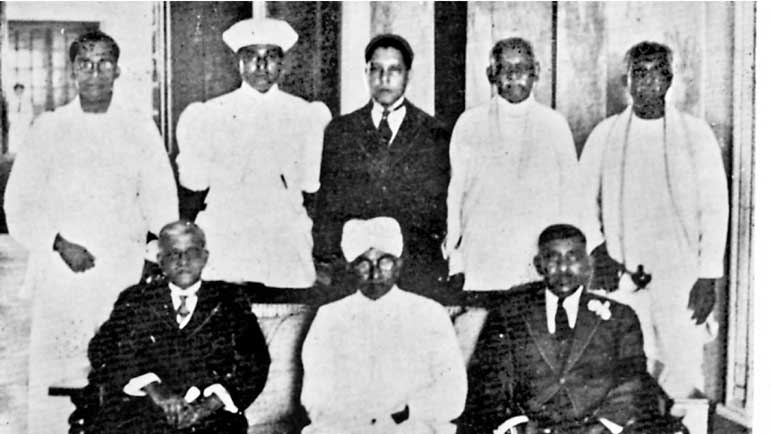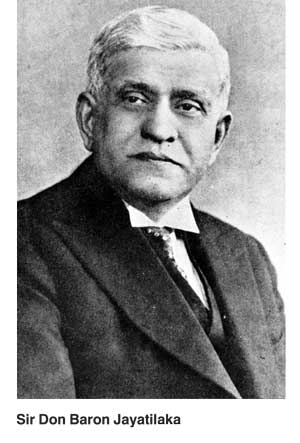Friday Feb 20, 2026
Friday Feb 20, 2026
Saturday, 13 February 2016 00:00 - - {{hitsCtrl.values.hits}}

Sir Baron Jayatilaka (seated, left) with Speaker Sir Waityalingam Duraiswamy of the second State Council and fellow Ministers D.S. Senanayake (seated, right). Second row, from left: S.W.R.D. Bandaranaike, Sir John Kotelawela, Sir Claude Corea, W.A. de Silva and C.W.W. Kannangara
By D.C. Ranatunga
“Today at a public meeting he blesses the Inspector-General of Police. Tomorrow the Buddhist Knight presides over the prize-giving of a Catholic School. The day after he would deliver a masterly appreciation of Sinhalese poetry or speak on the reform of the Sangha.
“Of an evening he would wind up a debate in the State Council, address a public meeting, put in an appearance at a gala in the Women’s International, give an interview, and spend the rest of the night chuckling over a Sinhalese play of which he is perforce patron, till the small hours.
“Perhaps the morning was spent in receiving a deputation, attending the meeting of the Board of Ministers, routine work at the  Ministry and –who knows – planting a jak tree as a ceremonial at the opening of a mental museum for lost superstitions.
Ministry and –who knows – planting a jak tree as a ceremonial at the opening of a mental museum for lost superstitions.
“All this at an age when most of us would be thinking of invalid chairs and acute lumbago!”
The quote is from the first in a series of articles on ‘Men of Ceylon’ written by ‘Janus’ in the Ceylon Daily News of 12 April 1937. Serving on the editorial staff of the Daily News, D.B. Dhanapala was using the pen name ‘Janus’.
The brilliant writer he was, Janus was writing on Sir Don Baron Jayatilaka, the Minister of Home Affairs, who was then 69 years old. Had he lived he would have been 148 years old today.
Hailing from Kelaniya, Sir Baron had his early education at the Vidyalankara Pirivena and later moved to Wesley College. He was the first principal of Dharmaraja College, Kandy (1890 – he was then 32) and moved to Ananda College in 1898 as vice-principal, becoming principal two years later. He was later to go the London (1913) where he got his degree at Oxford University, became a barrister and practised as an advocate.
A significant feature of Sir Baron’s life story was his leadership qualities in numerous fields.
A leading oriental scholar, he had his own style of writing in Sinhala which had hardly been matched in his time. Sir Baron had a sound knowledge of politics and was an effective speaker both in English and Sinhala.
As an educationist, apart from being principal of the leading Buddhist school, Ananda, he served the Buddhist Theosophical Society (BTS) as general manager (1905 and 1929), as secretary (1908) at a time when BTS managed a large number of Buddhist schools throughout the country, and as president (1927).
He founded the YMBA (Young Men’s Buddhist Association – 1898) which to this day commemorates his birthday with a memorial talk. He started the temperance movement and, as Janus recalls, it could not be much of a fashionable wedding if the first Buddhist Knight (he was knighted in 1932) did not drink cold water to the health of the bride!
He was a freelance journalist contributing to the Dinamina regularly.
His patronage was sought for all types of societies and associations ranging from juvenile volleyball clubs to the Royal Asiatic Society.
Janus presents his life story up to the mid-1930s thus: “’It was circumstances that made me a politician’, he told me as he sat in his sarong on the spacious verandah of his home in Horton Place, one moonlit night. Outside, not a breadth stirred the foliage.
“He told me of the life that was his as though he was unfolding a fairy-tale. It was a long, long climb along a winding road that took a great deal of time to cover.
“Uttering words of learned length he treaded the path as a school master following his Guru Olcott. Pleading with half-hearted eloquence at Hulftsdorp he paced the dusty road up the hill. Muttering quotations from the Dhammapada and denouncing drunkards as a Buddhist leader and temperance prophet he took some of the roughest bits of road in his time. Then as the political apprentice and social uplifter he became hot on the chase.
“As an agitator for reforms of the Constitution before the Secretary of the State for Colonies himself he came nearer the citadel at the top. National Congress Presidentship, the inevitable office that must come to even the laziest in the political field, came to him. With his election to the Reformed Legislative Council in 1924 and later being made the Vice-Chairman on the death of Sir James Peiris, the then Mr. D.B. Jayatilaka almost exceeded his expectations. But more was to follow.”
War days
After being elected member for Kelaniya in the first State Council (1931), he was elected Leader of the House and Minister of Home Affairs. Sir Baron had the distinction of presenting the first Budget by a Sri Lankan that year. In 1936, he was elected unopposed. Though his health was affecting him, even in his seventies, he continued to serve the nation particularly in the field of constitutional reform.
With the World War II things began to change rapidly. A War Council was formed under Sir Geoffrey Layton who wanted quick action and quick results. A grave food crisis was in sight with no firm solution.
Sir Baron’s biographer, Dr. Nandadeva Wijesekera questions whether younger men with full of ambition were pressing on his heels. “The war gave a fine excuse and opportunity to elevate him upstairs”, he writes. Sir Baron was appointed first High Commissioner (then called Resident Representative of Ceylon) to India as a special post under the ‘War Emergency’. Dr. Wijesekera had asked him whether he was strong enough to go to India. He was 74 at the time. “I am strong and quite fit nor am I frightened,” Sir Baron had said. And he went to New Delhi.
Dr. Wijesekera writes that Sir John Kotelawela had a different story on the appointment and he quotes Sir John: “We became aware of Sir D.B. Jayatilaka’s advanced age and temperamental unfitness for strong leadership. Sir Geoffrey Layton told me after a game of tennis that he thought it necessary to send a distinguished and competent person to represent Ceylon in India. Could I suggest anyone?
“I thought of Sir Arunachalem Mahadeva. Sir Arunachalem said after a few days that it would be better to send Sir Baron to India and that he himself might become the Home Minister. Sir Baron began to suspect that D.S. Senanayake was waiting impatiently to step into his shoes as Leader of the State Council. Senanayake would not have on any account have suggested that Sir Baron should be got out of the way in that manner.
“It was arranged for Admiral Layton at a meeting of the War Council to raise the question. And I took the cue and said that a great leader like Sir D.B. Jayatilaka would agree. Sir D.B. was taken completely by surprise. He wanted time to consider the matter. He finally yielded to pressure and agreed to go. Mahadeva succeeded him as Home Minister. D.S. Senanayake became Leader of the House.”
Dr. Wijesekera adds that those who elevated him may have failed to realise what they were doing and those who accompanied him may not have realised the gravity of his illness. He fell ill after some months of active and effective representation. At first it was a recurrence of malaria. In February he fell ill at Calcutta and after recovering he returned to Delhi. In mid-April he went to Mussorie, a hill station because Delhi was too hot. He developed stomach trouble there. He thought of returning home to take Ayurvedic treatment. But he had got a heart attack in Mussorie.
“But none was there to advice. He wished to return home immediately. He may have had a premonition of coming events. He wanted to return home perhaps to see his motherland and die at home at last. But it was too late. The Viceroy of India tried to help by placing a special plane for his journey. He passed away in Bangalore at 11:45 a.m. on 29 May 1944,” Dr. Wijesekera writes. (I remember the newspapers reporting that Sir Baron passed away on the plane.)
He was accorded a State funeral.